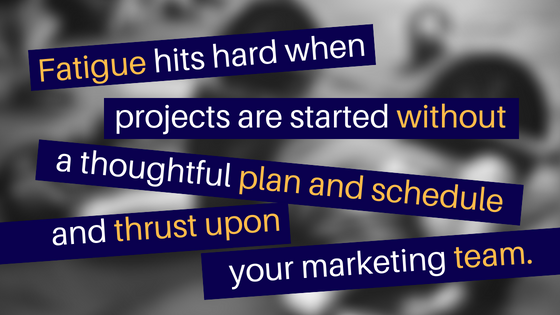
Photo Credit: Pexels.com – CC0 License, Victor Freitas
I’ve been in marketing for my entire career so I feel comfortable talking about a key issue that occurs frequently in marketing departments – project fatigue. Yes, this is real and can be damaging in many ways. Before we dive in, here’s my professional working definition. Project fatigue can be physical, emotional or intellectual and can drain an individual or team’s ability to carry a heavy load any further. Project fatigue is disruptive and is like a disease.
When unrecognized and untreated, project fatigue will negatively impact your marketing team and their productivity. Fatigue feels like your car is speeding beyond its limit and the wheels are shaking, steering safely is nearly impossible and staying under control is all but lost. Don’t do this to your marketing team.
In my opinion, the best marketers are not just the ones who constantly “deliver” every day. They also lift the heavy project load, climb the mountain and fight the battle to win – not just show up. However, when your team doesn’t have the energy to do that because of project fatigue, you’ve got a big problem. Here are a few things that can definitely cause project fatigue with your marketing team.
New Ideas
I think we all agree, new ideas are needed and marketers are pretty good at coming up with them. However, if you’re the boss and you’re constantly dumping ideas (good or not) on the team, this will quickly cause project fatigue. My suggestion is to schedule “new idea” sessions so all of you can bring ideas to the table to discuss. The goal of this session is to listen to all ideas, but also think about how they impact workflow and marketing goals. If they don’t fit either one, then the idea needs to be modified or tossed. The constant “I’ve got an idea and I want your team to get this started” is incredibly stressful. The next time you’re thinking that, take a step back and think about a better time to discuss and think through your idea with the team.
Timeline
Marketers are always operating on a timeline, so our natural inclination is to think about how fast we can crank out our projects and get them out the door because we need to make room on the schedule for the next project. This can eventually cause severe project fatigue. As projects start to pile up because we’re trying to accommodate every project, but slowing down others along the way, at some point the team will realize they can’t work any faster. Oh-oh, What happens next? I think we know the answer to this… project fatigue. The team will feel overwhelmed, over-worked and the normal creative energies that freely flow through a marketing department are gone, along with the “let’s get it done” attitude. Be realistic about when projects can be delivered. Don’t always try to squeeze a project through the workflow in two weeks if you know realistically it’s a four-week turnaround. Once in a while, this can be done, but not consistently.
“Though it seems contradictory, typically the longer a project has taken, and the bigger the scale of the fatigue and frustration, the less victorious it feels to finally finish.” – Ambientm.com
Planning
Just like a business needs a business plan, marketing also needs a plan that guides decision-making and action steps. This is not only the blueprint for how and why marketing initiatives get started and activated, but it also creates a system and methodology for which the marketing team thinks strategically and operationally. Your plan can be a high-level strategy or tactical roadmap. Either way it should define what will be worked on and why, as well as how it fits into daily and weekly workflows. This is very important.

Expectations
This could be one of your biggest challenges. Expectations are not always clear and understood, especially when an idea is shared swiftly at a meeting or over email. The person sharing the idea may feel as though their idea and project expectation is clearly understood but the marketing team on the other end may not have understood it and may think this project is not that important because they’re already doing something similar. Guess what? Project fatigue is about to set in at any moment. It’s critical to explain the concept and also the expectation. It’s also imperative for the marketing team to repeat the concept back to the person and what they think the project expectation is. After that, if there is any miscommunication, it should be resolved immediately. This will eliminate project fatigue and prevent undue stress and strain on your team.
Most often, it’s people, a poorly guided and unplanned process, timeline and unrealistic expectations that cause severe project fatigue. Look for these signs within your marketing department. When you spot them, jump in quickly to mitigate the negative effects. If you don’t and the project fatigue continues, your marketing team will lose their efficacy and productivity, or worse, they will quit.
Scott MacFarland is a lifelong marketer with a passion for content, marketing, digital, social, web, video, analytics, and all things that lead to successful conversions. Scott is currently the Marketing Director for HMY Yachts in Jupiter, Florida.
Follow Scott on LinkedIn or Twitter
Source: http://ambientm.com/5-tips-for-beating-project-fatigue/
Photo Credit: Pexels.com – CC0 License – Victor Freitas
https://www.pexels.com/photo/man-lying-on-rubber-mat-near-barbell-inside-the-gym-703009/
